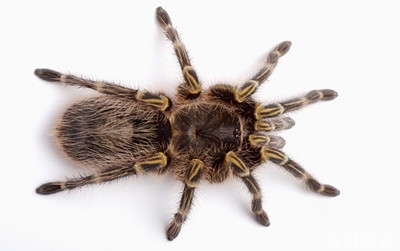科學(xué)技術(shù)
Sociable spiders
社會(huì)性蜘蛛
Come into my parlour
歡迎來(lái)做客
A strange example of co-operative behaviour in arachnids
一種懂得合作的不尋常的蜘蛛
SPIDERS are known for many things.
蜘蛛為人熟知的特點(diǎn)很多,
Sociability is not one of them.
但社會(huì)性不在其列。
Most spiders are more likely to try to eat their neighbours than befriend them.
多數(shù)蜘蛛更有可能想吃掉自己的鄰居,而非跟它們做朋友。
Given that there are at least 43,678 species of the critters, though, it is not too surprising that a few have overcome their natural grumpiness and teamed up to form societies.
不過(guò)考慮到這種生物至少有43678種,有那么幾種能克服天生乖戾的性情結(jié)群而居也就不足為奇了。
So far, about two dozen such social spiders have been identified.
目前已知的社會(huì)性蜘蛛約有24種。
And among them, something really strange has just been found.
其中還發(fā)現(xiàn)了一些奇特之處。
 For one type of spider society turns out to involve two different but closely related species.
For one type of spider society turns out to involve two different but closely related species.
在一種包含蜘蛛的群落中,有兩種親緣關(guān)系很近的蜘蛛。
It is as though anthropologists had discovered villages populated both by human beings and chimpanzees.
這就像是人類學(xué)家發(fā)現(xiàn)村落中既住著人類也住著黑猩猩。
This was discovered by a team led by Lena Grinsted of Aarhus University in Denmark.
這一現(xiàn)象由丹麥奧爾胡斯大學(xué)莉娜·格林斯蒂德帶領(lǐng)的團(tuán)隊(duì)發(fā)現(xiàn)。
They were studying a social species of spider called Chikunia nigra, living near Beratan Lake in Bali.
當(dāng)時(shí)他們?cè)谘芯恳环N生活在巴厘島貝拉坦湖畔、名為Chikunia nigra的社會(huì)性蜘蛛。
Later, as they looked in more detail at their specimens, they realised its genes and genitalia revealed that it was actually two species, according to their findings just published in Naturwissenschaften.
后來(lái)隨著對(duì)標(biāo)本研究的日益深入,他們發(fā)現(xiàn)基因和生殖器都表明標(biāo)本分屬兩個(gè)物種。其研究結(jié)果新近見刊于《自然科學(xué)》。
Exactly what the spiders get out of being social is not clear.
社會(huì)性對(duì)蜘蛛有何益處目前尚不清楚。
They do not hunt together.
它們并不共同捕食。
One explanation may be that the colony is acting like a giant creche.
一種可能的解釋是,這一群體像是大型托兒所。
Ms Grinsted discovered this possibility by experiment.
格林斯蒂德女士通過(guò)實(shí)驗(yàn)得出了這種可能性。
First, she identified 19 females who were looking after recently hatched young, and another 20 who had eggs.
首先,她找到19只照料新孵化幼蟲的雌蜘蛛以及20只剛產(chǎn)過(guò)卵的雌蜘蛛。
In each case she introduced an intruder, in the form of a spider from the same colony.
然后,她將來(lái)自同一群體的一只蜘蛛作為入侵者分別引入上述兩組個(gè)體。
Both mothers and mothers-to-be were surprisingly tolerant of what would, in most spider species, be a serious threat.
這些蜘蛛媽媽及準(zhǔn)媽媽出人意料地表現(xiàn)出容忍性,而不像多數(shù)種類的蜘蛛那樣將之視為嚴(yán)重威脅。
Only 40% of the time did they attempt to chase the intruder away, or bite it.
它們只在40%的時(shí)間中試圖趕走或咬噬入侵者。
Ms Grinsted then took another 40 spiders and swapped some of their broods.
隨后格林斯蒂德女士又取了40只蜘蛛并互換其部分幼蟲。
The upshot, she found, was that a female was as likely to look after and guard another's brood as she was her own.
她發(fā)現(xiàn)雌蜘蛛會(huì)將之視為己出,照料、保護(hù)幼蟲。
Which is intriguing, but not all that extraordinary in social groups which are composed of closely related individuals.
這一現(xiàn)象雖有趣,但在個(gè)體親緣關(guān)系相近的群體中也不算罕見。
Except that Ms Grinsted now knows that this cannot always be the case for her spiders, since two different species are involved.
只是格林斯蒂德女士現(xiàn)在已知道她的蜘蛛并非如此,因?yàn)槠渲邪瑑蓚€(gè)物種。
The species in question are pretty similar, which would seem to rule out another common cause of collaboration: that different creatures bring different adaptations to the party, thus dividing the labour of staying alive into specialisms.
而且兩種蜘蛛非常相似,這就排除了合作的另一常見原因,即不同生物在適應(yīng)該群落過(guò)程中發(fā)生不同變化,從而為生存進(jìn)行了專門化分工。
Because Ms Grinsted did not know at the time of her experiment that two species were involved, she cannot be sure how many of the fosterings she induced were cross-specific.
因?yàn)樽鰧?shí)驗(yàn)時(shí)格林斯蒂德女士并不知道涉及兩個(gè)物種,因此她現(xiàn)在無(wú)法確定有多少幼蟲交換是在種間進(jìn)行的。
The two species seem more or less equally abundant, so the chances are it was about half of them.
這兩個(gè)物種似乎一樣多,因此可能有一半是種間交換。
If colony members are acting as foster mothers in the wild, something most odd is going on.
如果在自然環(huán)境中該群體的成員也樂于做養(yǎng)母,這就是最奇怪之處:
Altruism is not a concept often associated with spiders. Xenophilic altruism is truly bizarre.
利他主義這個(gè)概念通常與蜘蛛沒什么關(guān)系;種間利他主義發(fā)生在蜘蛛身上,就更讓人難以置信了。
 For one type of spider society turns out to involve two different but closely related species.
For one type of spider society turns out to involve two different but closely related species.
 For one type of spider society turns out to involve two different but closely related species.
For one type of spider society turns out to involve two different but closely related species.